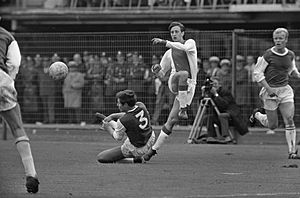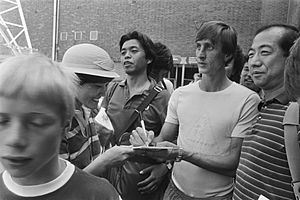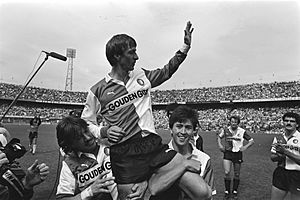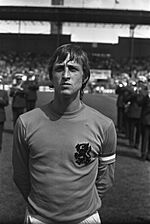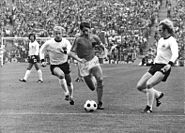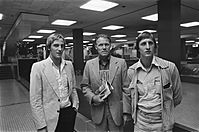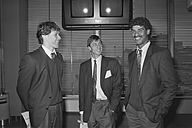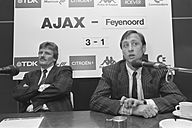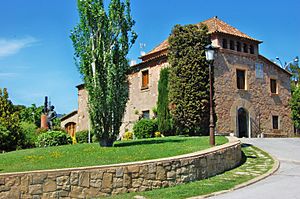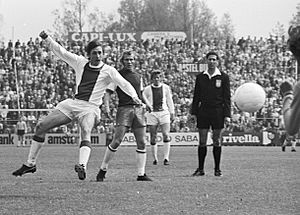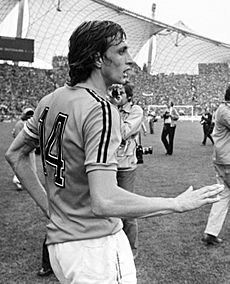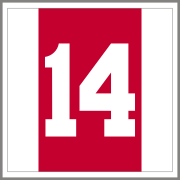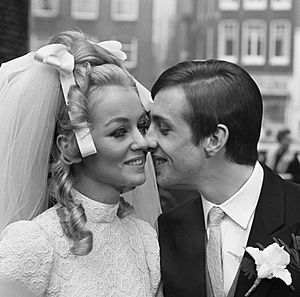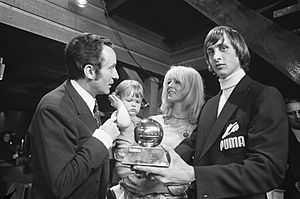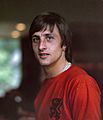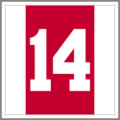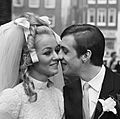Johan Cruyff facts for kids
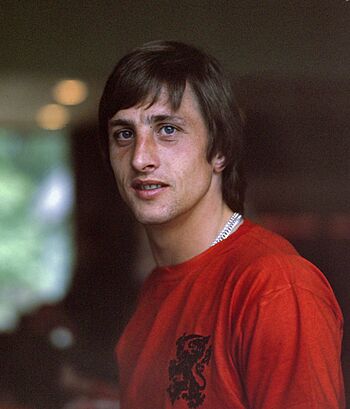
Cruyff with the Netherlands in 1974
|
||||||||||||||||||||||
| Personal information | ||||||||||||||||||||||
|---|---|---|---|---|---|---|---|---|---|---|---|---|---|---|---|---|---|---|---|---|---|---|
| Full name | Hendrik Johannes Cruijff | |||||||||||||||||||||
| Date of birth | 25 April 1947 | |||||||||||||||||||||
| Place of birth | Amsterdam, Netherlands | |||||||||||||||||||||
| Date of death | 24 March 2016 (aged 68) | |||||||||||||||||||||
| Place of death | Barcelona, Spain | |||||||||||||||||||||
| Height | 1.78 m (5 ft 10 in) | |||||||||||||||||||||
| Position(s) | Forward, attacking midfielder | |||||||||||||||||||||
| Youth career | ||||||||||||||||||||||
| 1957–1964 | Ajax | |||||||||||||||||||||
| Senior career* | ||||||||||||||||||||||
| Years | Team | Apps | (Gls) | |||||||||||||||||||
| 1964–1973 | Ajax | 245 | (193) | |||||||||||||||||||
| 1973–1978 | Barcelona | 143 | (48) | |||||||||||||||||||
| 1979 | Los Angeles Aztecs | 22 | (14) | |||||||||||||||||||
| 1980 | Washington Diplomats | 24 | (10) | |||||||||||||||||||
| 1981 | Levante | 10 | (2) | |||||||||||||||||||
| 1981 | Washington Diplomats | 5 | (2) | |||||||||||||||||||
| 1981–1983 | Ajax | 36 | (14) | |||||||||||||||||||
| 1983–1984 | Feyenoord | 33 | (11) | |||||||||||||||||||
| Total | 518 | (294) | ||||||||||||||||||||
| International career | ||||||||||||||||||||||
| 1966–1977 | Netherlands | 48 | (33) | |||||||||||||||||||
| Managerial career | ||||||||||||||||||||||
| 1985–1988 | Ajax | |||||||||||||||||||||
| 1988–1996 | Barcelona | |||||||||||||||||||||
| 2009–2013 | Catalonia | |||||||||||||||||||||
|
Medal record
|
||||||||||||||||||||||
| *Club domestic league appearances and goals | ||||||||||||||||||||||
Hendrik Johannes Cruijff (born 25 April 1947 – died 24 March 2016), known worldwide as Johan Cruyff, was a famous Dutch football player and manager. He won the Ballon d'Or award three times, in 1971, 1973, and 1974. Cruyff was a big supporter of a football style called Total Football, which was developed by Rinus Michels. Many people think he was one of the most important people in modern football history. He is seen as one of the best players and greatest managers ever.
In the late 1960s and early 1970s, Dutch football became very strong, moving from being less known to a top sport. Cruyff led the Netherlands to the final of the 1974 FIFA World Cup. He scored three goals and made three assists in that tournament. He also won the Golden Ball as the best player. After finishing third in UEFA Euro 1976, Cruyff decided not to play in the 1978 FIFA World Cup. This was because he and his family had a scary kidnapping attempt at their home in Barcelona.
At the club level, Cruyff started his career at Ajax. There, he won eight Dutch league titles (Eredivisie), three European Cups, and one Intercontinental Cup. For Ajax, he played 329 matches, scoring 257 goals and helping with over 170 assists. In 1973, he moved to Barcelona for a record-breaking fee. He helped Barcelona win La Liga in his first season and won another Ballon d'Or. For Barcelona, he played 180 official matches, scoring 60 goals and making 83 assists. After he stopped playing in 1984, Cruyff became a very successful manager for Ajax and then Barcelona. His son Jordi also played football professionally for Barcelona.
In 1999, Cruyff was voted European Player of the Century. He also came second behind Pelé in a worldwide player poll. He was chosen for the World Team of the 20th Century in 1998 and the FIFA World Cup Dream Team in 2002. In 2004, he was named in the FIFA 100 list of the world's greatest living players.
Contents
- Early Life and Football Dreams
- Playing for Clubs: A Star on the Field
- International Career: Leading the Netherlands
- Coaching Career: Building Dream Teams
- Other Football Activities and Legacy
- Nicknames
- Life Outside Football
- Personality and Famous Number 14
- Personal Life and Family
- Illness, Death, and Tributes
- Career Statistics
- Managerial Statistics
- Honours and Awards
- Images for kids
- See also
Early Life and Football Dreams
Johan Cruyff was born on 25 April 1947 in Amsterdam, Netherlands. He grew up very close to Ajax's stadium, which was his first football club. Johan was the second son of a working-class family. His father loved football and encouraged Johan to play with his school friends and older brother. Johan looked up to the famous Dutch dribbler, Faas Wilkes.
In 1959, when Johan was just 12, his father died from a heart attack. This event deeply affected him. He saw a football career as a way to honor his father. His mother started working as a cleaner at Ajax, which helped Johan feel even more connected to the club. She later married Henk Angel, an Ajax field worker, who became an important person in Cruyff's life.
Playing for Clubs: A Star on the Field
Ajax: The Golden Era of Total Football
Cruyff joined the Ajax youth team when he was ten. A youth coach noticed his talent and offered him a spot without a tryout. He loved baseball too, but stopped playing it at age fifteen to focus on football.
He played his first game for the senior team on 15 November 1964. In the 1965–66 season, he became a regular player, scoring 25 goals in 23 games. Ajax won the league championship that year.
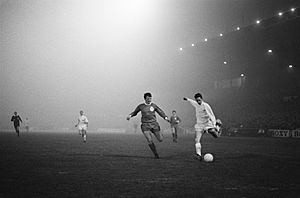
In the 1966–67 season, Ajax won both the league and the KNVB Cup, which was Cruyff's first "double" (winning two major trophies in one season). He was the top scorer in the league with 33 goals. Ajax won the league again in 1967–68 and 1969–70. In 1969, Cruyff played in his first European Cup final, but Ajax lost 4–1 to Milan.
In the 1970–71 season, Cruyff started wearing the number 14 jersey instead of his usual number 9. This was unusual at the time, as starting players usually wore numbers 1 to 11. But from then on, number 14 became his famous number, even for the national team. In 1971, Ajax won the European Cup for the first time, beating Panathinaikos 2–0. Cruyff was named the Dutch and European Footballer of the Year.
In 1972, Ajax won their second European Cup, beating Inter Milan 2–0, with Cruyff scoring both goals. This win showed the world the power of "Total Football". Ajax also won the Dutch Cup and the league that year. They then won the Intercontinental Cup and the European Super Cup. The 1972–73 season ended with another league title and a third European Cup win, beating Juventus 1–0.
Barcelona: A New Chapter in Spain
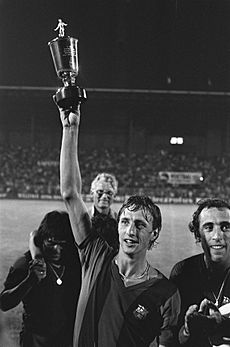
In 1973, Cruyff moved to Barcelona for a world record transfer fee. He quickly became a favorite with Barcelona fans. He named his son Jordi, a popular Catalan name, which was a special gesture. He helped the club win La Liga for the first time in 14 years, famously beating their rivals Real Madrid 5–0. Many people felt Cruyff brought new hope and spirit to the Catalan people. In 1974, he was again named European Footballer of the Year.
During his time at Barcelona, Cruyff scored an amazing goal against Atlético Madrid. He jumped in the air and kicked the ball with his right heel, sending it past the goalkeeper. This goal is still remembered as "Cruyff's impossible goal". In 1978, Barcelona won the Copa del Rey (Spanish Cup).
Playing in the United States and Return to Europe
After losing money in some bad investments, Cruyff decided to play football again in 1979. He moved to the United States to play for the Los Angeles Aztecs in the NASL. He was named NASL Player of the Year. In 1980, he played for the Washington Diplomats.
In 1981, Cruyff returned to Spain to play for Levante in the second division. However, injuries and disagreements meant he only played ten games. He then had a short second spell with the Washington Diplomats.
Back to Ajax and Final Season at Feyenoord
In December 1981, Cruyff returned to play for Ajax. With him, Ajax won the league championship in the 1981–82 and 1982–83 seasons. In 1982–83, they also won the Dutch Cup. He scored a famous penalty goal in 1982, where he passed the ball sideways to a teammate, who passed it back for Cruyff to tap into an empty net.
At the end of the 1982–83 season, Ajax did not offer Cruyff a new contract. This made him upset, so he signed with Ajax's biggest rivals, Feyenoord. His season at Feyenoord was very successful. The club won the Eredivisie for the first time in ten years, and also won the KNVB Cup. Even though he was older, Cruyff played almost every league match. He was voted Dutch Footballer of the Year for the fifth time. He retired from playing football in May 1984.
International Career: Leading the Netherlands
Cruyff played 48 matches for the Dutch national team, scoring 33 goals. The team never lost a game when Cruyff scored. He made his debut in 1966 and scored in a 2–2 draw against Hungary. In his second match, he received a red card, becoming the first Dutch international to do so.
Cruyff was known for wearing a jersey with two black stripes on the sleeves, instead of the usual three stripes worn by other Dutch players. This was because he had a sponsorship deal with Puma, while the team's kit was made by Adidas. From 1970 onwards, he wore the number 14 jersey for the Netherlands, making it a famous number.
Cruyff led the Netherlands to the final of the 1974 FIFA World Cup. He was named the best player of the tournament. His team's "Total Football" style helped them reach the final, beating strong teams like Argentina (4–0) and Brazil (2–0). Cruyff scored two goals against Argentina and one against Brazil.
In the final, the Netherlands played against hosts West Germany. The Dutch team passed the ball around 15 times before Cruyff was fouled in the box, leading to a penalty. His teammate scored, giving the Netherlands a 1–0 lead before West Germany even touched the ball. However, West Germany came back to win 2–1.
After 1976: Retiring from International Play
Cruyff retired from international football in October 1977, after helping the team qualify for the next World Cup. Without him, the Netherlands finished as runners-up again in the 1978 World Cup. Cruyff later explained that he and his family had been victims of a kidnapping attempt in Barcelona a year before the tournament. This made him decide to prioritize his family and stop playing for the national team. He felt he needed to be "200% okay" to play in a World Cup, and his family's safety was more important.
Coaching Career: Building Dream Teams
Ajax Manager: Implementing New Ideas
After retiring as a player, Cruyff became a manager, following his mentor Rinus Michels. In 1985, he returned to Ajax as manager. He led a young Ajax team to win the European Cup Winners' Cup in 1987. During this time, Cruyff put his favorite team formation into practice. This system was so successful that Ajax later won the Champions League in 1995 using his methods.
Barcelona Manager: The "Dream Team" Era
Cruyff returned to Barcelona in 1988, this time as the coach. He took over a team that was facing problems and quickly changed their style of play to his attractive, attacking football. He brought in talented players like Pep Guardiola, Ronald Koeman, Michael Laudrup, and Romário.
Under Cruyff, Barcelona had a very successful period. In five years (1989–1994), he led the club to four European finals. His team, known as the "Dream Team", won four La Liga titles in a row (1991–1994). They also won the European Cup in 1992 at Wembley Stadium. Before that final, Cruyff famously told his players, "Go out and enjoy it." Barcelona won with a brilliant free kick goal in extra time.
Other big wins under Cruyff included a 5–0 La Liga victory over Real Madrid and a 4–0 win against Manchester United in the Champions League. He also won the Copa del Rey, the European Super Cup, and three Spanish Super Cups. With 11 trophies, Cruyff was Barcelona's most successful manager for a long time, until his former player Pep Guardiola surpassed him. Cruyff was also the club's longest-serving manager. He left Barcelona in 1996.
Catalonia National Team Manager
Cruyff also managed the Catalonia national team from 2009 to 2013. He led the team to a victory over Argentina in his first match.
Other Football Activities and Legacy
Technical Advisor Roles
After his heart attack in 1991, Cruyff was advised to stop coaching. He left Barcelona in 1996 but remained a strong voice in football. He supported Joan Laporta to become Barcelona's president and advised him, recommending Frank Rijkaard as manager in 2003 and later Pep Guardiola in 2008. Cruyff believed Guardiola, despite his lack of experience, had the right qualities.
In 2010, Cruyff was made honorary president of Barcelona for his contributions. However, the new president, Sandro Rosell, later removed this title. Cruyff also returned to Ajax in an advisory role in 2011 to help reform the club, especially its youth academy. He also worked as a technical advisor for Mexican club Guadalajara in 2012.
Style of Play: The "Total Footballer"
Cruyff is famous for his "Total Football" style. In this system, players are not stuck in one position. If a player moves out of their spot, another teammate covers it, keeping the team's shape. Cruyff was the "conductor" on the field, guiding his teammates. This style focused on creating and using space. Cruyff, who played as a forward, would often drop back or move to the wing to confuse opponents.
Cruyff was known for his amazing technical skills, speed, and vision. He understood where his teammates were and where the ball needed to go. He believed that football was a game played with the brain, not just the legs. He famously said, "Technique is not being able to juggle a ball 1,000 times. Anyone can do that by practising. Technique is passing the ball with one touch, with the right speed, at the right foot of your team mate."
Winning with Style: Cruyff's Philosophy
Cruyff believed that winning was important, but how you won was even more important. He wanted his teams to play with a beautiful, entertaining style. He said, "Quality without results is pointless. Results without quality is boring." He also believed in simplicity, saying, "Simple football is the most beautiful. But playing simple football is the hardest thing."
Cruyff also perfected a special move called the "Cruyff Turn". He would pretend to pass or cross the ball, then drag it behind his planted foot, turn 180 degrees, and run away from the defender. It was a simple, effective way to beat an opponent.
Cruyff's 14 Rules
Cruyff created 14 basic rules, which are displayed at every Cruyff Court (small football fields) around the world. These rules teach young people life lessons through sports:
- Team player – 'To accomplish things, you have to do them together.'
- Responsibility – 'Take care of things as if they were your own.'
- Respect – 'Respect one another.'
- Integration – 'Involve others in your activities.'
- Initiative – 'Dare to try something new.'
- Coaching – 'Always help each other within a team.'
- Personality – 'Be yourself.'
- Social involvement – 'Interaction is crucial, both in sport and in life.'
- Technique – 'Know the basics.'
- Tactics – 'Know what to do.'
- Development – 'Sport strengthens body and soul.'
- Learning – 'Try to learn something new every day.'
- Play together – 'An essential part of any game.'
- Creativity – 'Bring beauty to the sport.'
Things Named After Cruyff
Many things have been named after Johan Cruyff to honor him:
- Cruyff turn: A famous dribbling trick he perfected.
- Johan Cruyff Shield: A football trophy in the Netherlands.
- Johan Cruyff Award: Given to the best young Dutch football talent.
- 14282 Cruijff: An asteroid named after him.
- Johan Cruyff Institute: An educational place for athletes and sports professionals.
- Johan Cruyff Foundation: A charity that helps children play sports.
- Cruyff Courts: Small football fields for children.
- Cruijffiaans: The special way of speaking and sayings he was known for.
- Cruyffista: A follower of Cruyff's ideas about football.
- Johan Cruyff Stadium: FC Barcelona's new stadium.
- Johan Cruyff Arena: The stadium in Amsterdam, previously called the Amsterdam Arena.
Nicknames
Cruyff had many nicknames, including "Jopie", "Nummer 14" (Number 14), "Het orakel van Betondorp" (the prophet of Betondorp), "El Salvador" (The Saviour), and "El Flaco" (The Skinny One). "El Salvador" was given to him because he helped Barcelona during tough times.
Life Outside Football
Hobbies and Businesses
Outside of football, Cruyff loved to play golf. In the 1970s, he also enjoyed collecting cars. In 1979, he started his own footwear brand, Cruyff Classics, which made stylish and functional sports shoes.
Writing and Languages
Cruyff wrote several books about his football career and his ideas about the sport. He also wrote weekly columns for newspapers in Barcelona and Amsterdam. He was good at many languages, speaking Dutch, English, French, Spanish, and German.
Helping Others: Philanthropy
The Johan Cruyff Foundation has created over 200 Cruyff Courts in 22 countries. These courts give children from all backgrounds a safe place to play street football. The foundation has been praised for its positive impact on young people. In 1999, he also started the Johan Cruyff Institute to educate athletes and sports professionals.
Personality and Famous Number 14
Cruyff was known for his strong personality. He grew up in the Netherlands after World War II and lost his father early, which shaped his character. He was an idealist who believed in his principles.
In 1973, when Ajax players voted for a new captain, they chose someone else over Cruyff. This made him decide to leave Ajax and join Barcelona. He chose Barcelona over Real Madrid because he felt Barcelona was "more than a club" and represented a challenge. His decision to name his son Jordi, a Catalan name, was also seen as a statement during a time of political tension in Spain.
Cruyff's strong personality also showed in his sponsorship deals. At the 1974 World Cup, he refused to wear the usual three stripes of Adidas because he had a deal with Puma. So, a special jersey with only two stripes was made just for him.
The Iconic Number 14
Before the 1990s, players didn't usually have fixed numbers. Starting players wore numbers 1 to 11. Cruyff's usual number was 9. However, on 30 October 1970, his teammate couldn't find his number 7 jersey. Cruyff offered his shirt and picked number 14 by chance. Ajax won that game, and Cruyff suggested they keep the same numbers. From then on, number 14 became his trademark for Ajax and the Netherlands national team.
In the 1974 FIFA World Cup, the coach wanted numbers to be alphabetical, which would have made Cruyff number 1. But he insisted on wearing his lucky number 14. In 2007, Ajax officially retired Cruyff's number 14 jersey to honor him.
His Views and Criticisms
Cruyff was known for being outspoken and having strong opinions. He often criticized things he felt were wrong in football. For example, he criticized the Netherlands' style of play at the 2010 World Cup, saying he preferred Spain's style, which was like Barcelona's.
He also spoke out against money taking over football. When Barcelona signed a shirt sponsorship deal with Qatar Foundation, Cruyff said it made the club "vulgar" because they had always kept their jersey free of sponsors. He believed football was losing its pure values because of money.
Personal Life and Family
On 2 December 1968, Cruyff married Diana Margaretha "Danny" Coster, whom he met at a teammate's wedding. Her father was also Cruyff's agent and helped him move to Barcelona. They had three children: Chantal, Susila, and Jordi. The family lived in Barcelona since 1973.
In 1977, Cruyff decided to retire from international football at age 30. Years later, he explained that this was because he and his family had been victims of an armed attack at their home in Barcelona. He said, "There are moments in life in which there are other values." He wanted to protect his family, and police even slept at their house for months.
Cruyff named his third child Jordi, after the patron saint of Catalonia. This was a bold move because the Spanish government at the time had banned symbols of Catalan nationalism. Cruyff had to fly his son to the Netherlands to register his birth with that name. This showed his support for Catalan culture and made him a hero to Barcelona fans.
His son Jordi Cruyff played for teams like Barcelona (when his father was manager) and Manchester United. Cruyff's grandson, Jesjua Angoy, also played football.
Illness, Death, and Tributes
Cruyff was a heavy smoker until he had heart surgery in 1991. After that, he quit smoking and would often suck on lollipops during games. He even appeared in an advertisement saying, "Football has given me everything in life, tobacco almost took it all away."
In October 2015, he was diagnosed with lung cancer. Football fans and clubs around the world sent him messages of support. All Dutch league games featured a round of applause in the 14th minute, honoring his famous jersey number. Barcelona players wore special T-shirts saying "Ànims Johan" (Get well soon Johan).
In February 2016, Cruyff said he was responding well to chemotherapy and was "winning" his cancer battle. However, he passed away on 24 March 2016, at the age of 68, in Barcelona. His lung cancer had spread to his brain. He was cremated in a private ceremony.
Many people, including players, managers, and clubs, paid tribute to him. Thousands of Barcelona fans visited a memorial at the Camp Nou stadium. A friendly match between the Netherlands and France was stopped in the 14th minute for a minute of applause. Barcelona also planned five special tributes for their next match, including a mosaic of 90,000 fans spelling "Gràcies Johan" (Thank you, Johan) and players wearing special shirts.
Career Statistics
Club
| Club | Season | League | Cup | Continental | Other | Total | ||||||
|---|---|---|---|---|---|---|---|---|---|---|---|---|
| Division | Apps | Goals | Apps | Goals | Apps | Goals | Apps | Goals | Apps | Goals | ||
| Ajax | 1964–65 | Eredivisie | 10 | 4 | 0 | 0 | — | — | 10 | 4 | ||
| 1965–66 | 19 | 16 | 4 | 9 | — | — | 23 | 25 | ||||
| 1966–67 | 30 | 33 | 5 | 5 | 6 | 3 | — | 41 | 41 | |||
| 1967–68 | 33 | 27 | 5 | 6 | 2 | 1 | — | 40 | 34 | |||
| 1968–69 | 29 | 24 | 3 | 3 | 10 | 6 | 1 | 1 | 43 | 34 | ||
| 1969–70 | 33 | 23 | 5 | 6 | 8 | 4 | — | 46 | 33 | |||
| 1970–71 | 25 | 21 | 6 | 5 | 6 | 1 | — | 37 | 27 | |||
| 1971–72 | 32 | 25 | 4 | 3 | 9 | 5 | — | 45 | 33 | |||
| 1972–73 | 32 | 17 | 0 | 0 | 6 | 3 | 4 | 3 | 42 | 23 | ||
| 1973–74 | 2 | 3 | 0 | 0 | 0 | 0 | 0 | 0 | 2 | 3 | ||
| Total | 245 | 193 | 32 | 37 | 47 | 23 | 5 | 4 | 329 | 257 | ||
| Barcelona | 1973–74 | La Liga | 26 | 16 | 12 | 8 | 0 | 0 | — | 38 | 24 | |
| 1974–75 | 30 | 7 | 12 | 7 | 8 | 0 | — | 50 | 14 | |||
| 1975–76 | 29 | 6 | 10 | 3 | 9 | 2 | — | 48 | 11 | |||
| 1976–77 | 30 | 14 | 9 | 6 | 7 | 5 | — | 46 | 25 | |||
| 1977–78 | 28 | 5 | 7 | 1 | 10 | 5 | — | 45 | 11 | |||
| Total | 143 | 48 | 50 | 25 | 34 | 12 | — | 227 | 85 | |||
| Los Angeles Aztecs | 1979 | NASL | 22 | 14 | — | — | 4 | 1 | 26 | 15 | ||
| Washington Diplomats | 1980 | NASL | 24 | 10 | — | — | 2 | 0 | 26 | 10 | ||
| Levante | 1980–81 | Segunda División | 10 | 2 | 0 | 0 | — | — | 10 | 2 | ||
| Washington Diplomats | 1981 | NASL | 5 | 2 | — | — | — | 5 | 2 | |||
| Ajax | 1981–82 | Eredivisie | 15 | 7 | 1 | 0 | 0 | 0 | — | 16 | 7 | |
| 1982–83 | 21 | 7 | 7 | 2 | 2 | 0 | — | 30 | 9 | |||
| Total | 36 | 14 | 8 | 2 | 2 | 0 | — | 46 | 16 | |||
| Feyenoord | 1983–84 | Eredivisie | 33 | 11 | 7 | 1 | 4 | 1 | — | 44 | 13 | |
| Career total | 518 | 294 | 97 | 65 | 87 | 36 | 11 | 5 | 713 | 400 | ||
International
| National team | Year | Apps | Goals |
|---|---|---|---|
| Netherlands | 1966 | 2 | 1 |
| 1967 | 3 | 1 | |
| 1968 | 1 | 0 | |
| 1969 | 3 | 1 | |
| 1970 | 2 | 2 | |
| 1971 | 4 | 6 | |
| 1972 | 5 | 5 | |
| 1973 | 6 | 6 | |
| 1974 | 12 | 8 | |
| 1975 | 2 | 0 | |
| 1976 | 4 | 2 | |
| 1977 | 4 | 1 | |
| Total | 48 | 33 | |
- Scores and results list the Netherlands' goal tally first, score column indicates score after each Cruyff goal.
| No. | Date | Venue | Opponent | Score | Result | Competition |
|---|---|---|---|---|---|---|
| 1 | 7 September 1966 | Rotterdam, Netherlands | 2–0 | 2–2 | UEFA Euro 1968 qualifying | |
| 2 | 13 September 1967 | Amsterdam, Netherlands | 1–0 | 1–0 | UEFA Euro 1968 qualifying | |
| 3 | 26 March 1969 | Rotterdam, Netherlands | 1–0 | 4–0 | 1970 FIFA World Cup qualification | |
| 4 | 2 December 1970 | Amsterdam, Netherlands | 1–0 | 2–0 | Friendly | |
| 5 | 2–0 | |||||
| 6 | 24 February 1971 | Rotterdam, Netherlands | 3–0 | 6–0 | UEFA Euro 1972 qualifying | |
| 7 | 4–0 | |||||
| 8 | 17 November 1971 | Eindhoven, Netherlands | 1–0 | 8–0 | UEFA Euro 1972 qualifying | |
| 9 | 7–0 | |||||
| 10 | 8–0 | |||||
| 11 | 1 December 1971 | Amsterdam, Netherlands | 1–0 | 2–1 | Friendly | |
| 12 | 16 February 1972 | Athens, Greece | 3–0 | 5–0 | Friendly | |
| 13 | 5–0 | |||||
| 14 | 30 August 1972 | Prague, Czechoslovakia | 1–0 | 2–1 | Friendly | |
| 15 | 1 November 1972 | Rotterdam, Netherlands | 4–0 | 9–0 | 1974 FIFA World Cup qualification | |
| 16 | 8–0 | |||||
| 17 | 2 May 1973 | Amsterdam, Netherlands | 3–2 | 3–2 | Friendly | |
| 18 | 22 August 1973 | Amsterdam, Netherlands | 2–0 | 5–0 | 1974 FIFA World Cup qualification | |
| 19 | 5–0 | |||||
| 20 | 29 August 1973 | Deventer, Netherlands | 2–0 | 8–1 | 1974 FIFA World Cup qualification | |
| 21 | 4–0 | |||||
| 22 | 12 September 1973 | Oslo, Norway | 1–0 | 2–1 | 1974 FIFA World Cup qualification | |
| 23 | 26 June 1974 | Gelsenkirchen, West Germany | 1–0 | 4–0 | 1974 FIFA World Cup | |
| 24 | 4–0 | |||||
| 25 | 3 July 1974 | Dortmund, Germany | 2–0 | 2–0 | 1974 FIFA World Cup | |
| 26 | 4 September 1974 | Stockholm, Sweden | 1–0 | 5–1 | Friendly | |
| 27 | 25 September 1974 | Helsinki, Finland | 1–1 | 3–1 | UEFA Euro 1976 qualifying | |
| 28 | 2–1 | |||||
| 29 | 20 November 1974 | Rotterdam, Netherlands | 2–1 | 3–1 | UEFA Euro 1976 qualifying | |
| 30 | 3–1 | |||||
| 31 | 22 May 1976 | Brussels, Belgium | 2–1 | 2–1 | UEFA Euro 1976 qualifying | |
| 32 | 13 October 1976 | Rotterdam, Netherlands | 2–1 | 2–2 | 1978 FIFA World Cup qualification | |
| 33 | 26 March 1977 | Antwerp, Belgium | 2–0 | 2–0 | 1978 FIFA World Cup qualification |
Managerial Statistics
| Team | From | To | Record | ||||
|---|---|---|---|---|---|---|---|
| G | W | D | L | Win % | |||
| Ajax | 6 June 1985 | 4 January 1988 | 117 | 86 | 10 | 21 | 73.50 |
| Barcelona | 4 May 1988 | 18 May 1996 | 430 | 250 | 97 | 83 | 58.14 |
| Catalonia | 2 November 2009 | 2 January 2013 | 4 | 2 | 2 | 0 | 50.00 |
| Total | 551 | 338 | 109 | 104 | 61.34 | ||
Honours and Awards
Player Honours
Ajax
- Eredivisie: 1965–66, 1966–67, 1967–68, 1969–70, 1971–72, 1972–73, 1981–82, 1982–83
- KNVB Cup: 1966–67, 1969–70, 1970–71, 1971–72, 1982–83
- European Cup: 1970–71, 1971–72, 1972–73
- European Super Cup: 1972
- Intercontinental Cup: 1972
Barcelona
- La Liga: 1973–74
- Copa del Rey: 1977–78
Feyenoord
- Eredivisie: 1983–84
- KNVB Cup: 1983–84
International
- FIFA World Cup Runner-up: 1974
- UEFA European Championship Third place: 1976
Manager Honours
- Ajax
- KNVB Cup: 1985–86, 1986–87
- European Cup Winners' Cup: 1986–87
- Barcelona
- La Liga: 1990–91, 1991–92, 1992–93, 1993–94
- Copa del Rey: 1989–90
- Supercopa de España: 1991, 1992, 1994
- European Cup: 1991–92
- European Cup Winners' Cup: 1988–89
- European Super Cup: 1992
Individual Awards
Player
- Ballon d'Or: 1971, 1973, 1974
- Eredivisie top scorer: 1966–67, 1971–72
- Dutch Footballer of the Year: 1968, 1972, 1984
- FIFA World Cup Golden Ball: 1974
- FIFA 100: 2004
- World Soccer's The Greatest Players of the 20th Century: #3
- IFFHS European Player of the Century: #1
- IFFHS World Player of the Century: #2
Manager
- World Soccer Awards Manager of the Year: 1987
- European Coach of the Season: 1991–92
Other Honours
- In 1974, Cruyff was made a Knight of the Order of Orange-Nassau.
- In 2002, he was promoted to Officer of the Order of Orange-Nassau.
- In 2004, he was chosen as the Golden Player of the Netherlands by the KNVB.
- In 2006, he received a Lifetime Achievement Award from Laureus.
- On 18 April 2007, Ajax retired the number 14 shirt in his honor.
- In 2010, Cruyff received the FIFA Order of Merit, FIFA's highest honor.
- In 2013, Cruyff was given the UEFA President's Award.
- On 25 October 2017, the Amsterdam Arena was renamed Johan Cruyff Arena.
Images for kids
See also
 In Spanish: Johan Cruyff para niños
In Spanish: Johan Cruyff para niños


